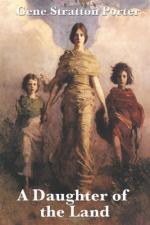Adam was his father’s favourite son, a stalwart, fine-appearing, big man, silent, honest, and forceful; the son most after the desires of the father’s heart, yet Adam was the one son of the seven who had ignored his father’s law that all of his boys were to marry strong, healthy young women, poor women, working women. Each of the others at coming of age had contracted this prescribed marriage as speedily as possible, first asking father Bates, the girl afterward. If father Bates disapproved, the girl was never asked at all. And the reason for this docility on the part of these big, matured men, lay wholly in the methods of father Bates. He gave those two hundred acres of land to each of them on coming of age, and the same sum to each for the building of a house and barn and the purchase of stock; gave it to them in words, and with the fullest assurance that it was theirs to improve, to live on, to add to. Each of them had seen and handled his deed, each had to admit he never had known his father to tell a lie or deviate the least from fairness in a deal of any kind, each had been compelled to go in the way indicated by his father for years; but not a man of them held his own deed. These precious bits of paper remained locked in the big wooden chest beside the father’s bed, while the land stood on the records in his name; the taxes they paid him each year he, himself, carried to the county clerk; so that he was the largest landholder in the county and one of the very richest men. It must have been extreme unction to his soul to enter the county office and ask for the assessment on those “little parcels of land of mine.” Men treated him very deferentially, and so did his sons. Those documents carefully locked away had the effect of obtaining ever-ready help to harvest his hay and wheat whenever he desired, to make his least wish quickly deferred to, to give him authority and the power for which he lived and worked earlier, later, and harder than any other man of his day and locality.
Adam was like him as possible up to the time he married, yet Adam was the only one of his sons who disobeyed him; but there was a redeeming feature. Adam married a slender tall slip of a woman, four years his senior, who had been teaching in the Hartley schools when he began courting her. She was a prim, fussy woman, born of a prim father and a fussy mother, so what was to be expected? Her face was narrow and set, her body and her movements almost rigid, her hair, always parted, lifted from each side and tied on the crown, fell in stiff little curls, the back part hanging free. Her speech, as precise as her movements, was formed into set habit through long study of the dictionary. She was born antagonistic to whatever existed, no matter what it was. So surely as every other woman agreed on a dress, a recipe, a house, anything whatever, so surely Agatha thought out and followed a different method, the disconcerting thing about her being that she usually finished any undertaking with less exertion, ahead of time, and having saved considerable money.




